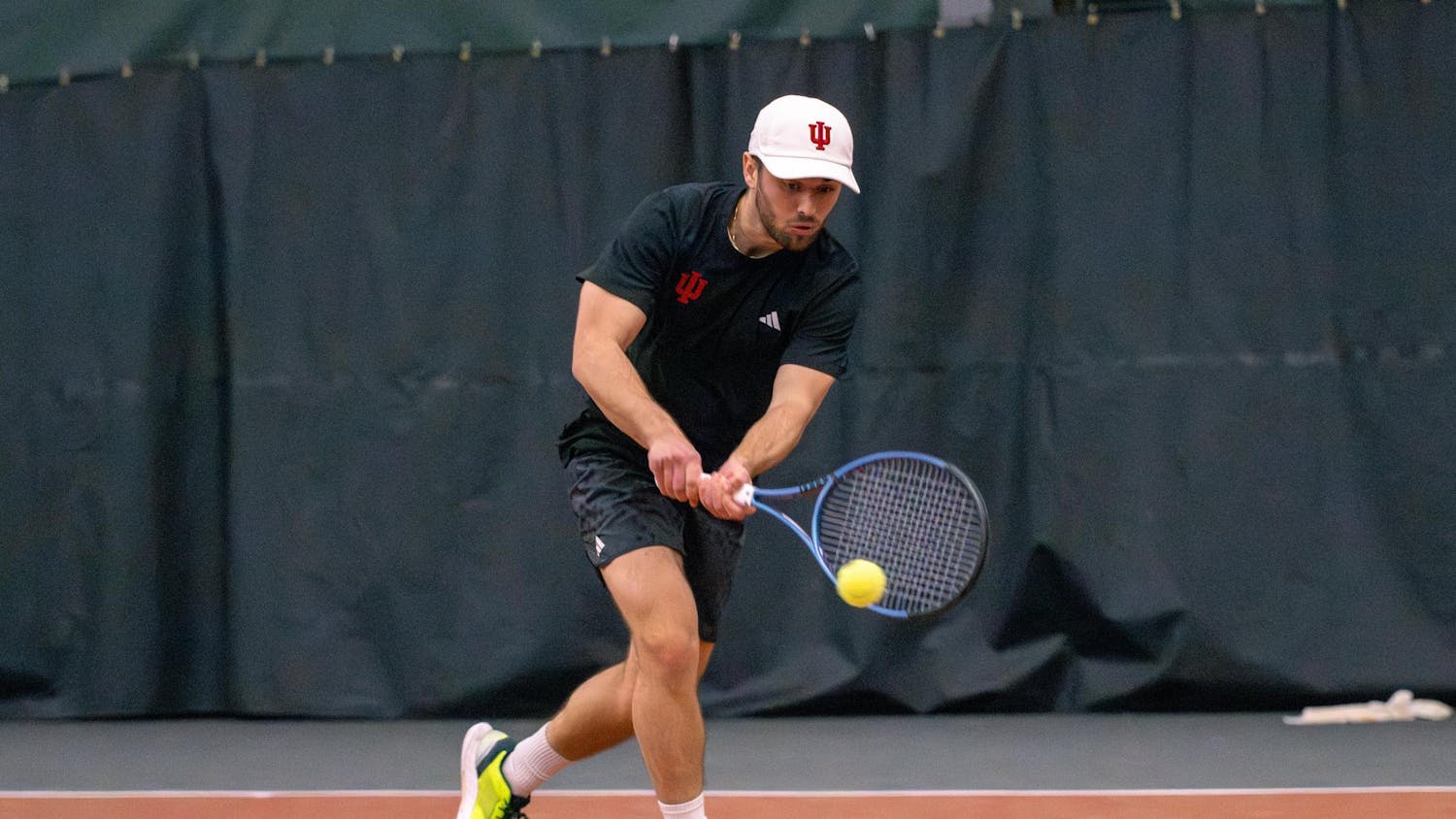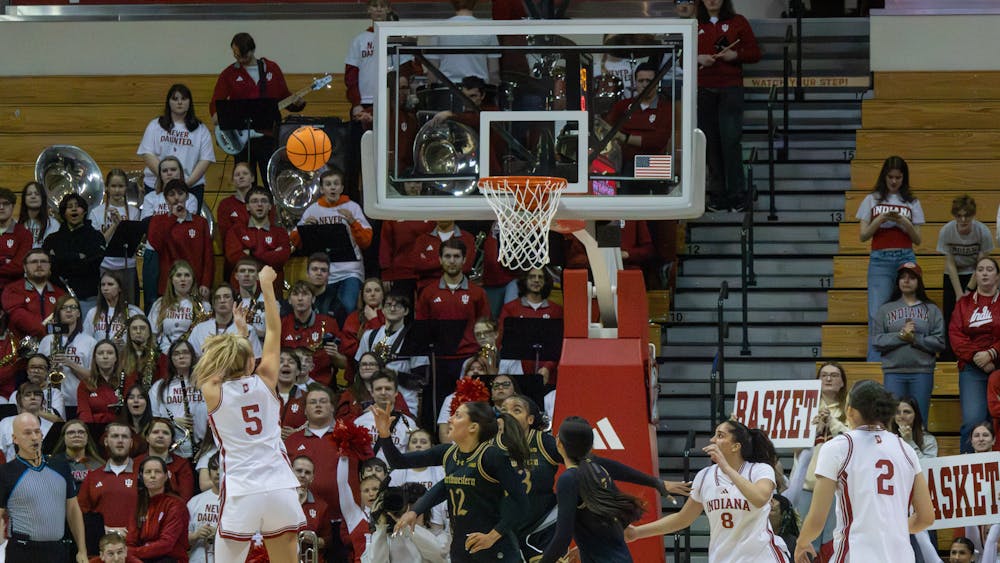Interested in writing a letter to the editor or guest column to the Indiana Daily Student? Check out our guidelines and submission details here.
I am a proud alumnus of IU Bloomington, an IU Wells Scholar and a recipient of IU’s Elvis J. Stahr senior award for campus leadership. April 8 — the day of the solar eclipse — marked my first time on campus since graduating in 2020. It ended with my arrest on Dunn Meadow.
My crime? Well, that’s still unclear. What is clear from my arrest, which was personally overseen by IUPD’s interim chief of police, is that the IU administration is willing to lock up their own to silence dissent. The baffling arrest was apparently punishment for standing in solidarity with students and campus community members as we called on the IU administration to protect academic freedom, defend the university from far-right extremism, and divest from military and corporate partnerships that make students complicit in genocidal acts abroad.
When I was an IU student, I served as president of Culture of Care, IUSG’s student body treasurer and director of the LGBTQ+ Mentorship Program through the LGBTQ+ Culture Center. In 2020, I received the nationally competitive Marshall Scholarship for graduate studies in the United Kingdom. After graduating with a master’s degree from the University of Oxford, I became a research fellow in economics at Yale University, then Princeton. My academic career has led me to move five times in the three-and-a-half years since graduating IU, but my one constant has been my close connection to IU-Bloomington.
Over the last several months, I have followed the news of Indiana’s assault on academic freedom and campus free speech in horror. When Gov. Holcomb signed Senate Bill 202 — which puts state-appointed puppet trustees on the Board of Trustees and establishes a process for firing tenured professors who express political views in the classroom — I decided alumni had a responsibility to speak up. I reached out to my friends on campus to ask how I could help.
What I heard from current students and faculty members was disheartening. They told me that the university had succumbed to pressure from the far right and state GOP to target local pro-Palestine advocates, along with pro-peace and anti-genocide allies. This is all in the name of combating antisemitism, despite the fact that the most frightening incidents of antisemitism in our community have been perpetrated by racist fraternity brothers and white supremacists, not advocates for peace. Students, who are eager to fight antisemitism more effectively alongside other forms of hate, told me they were worried about their fundamental rights to assemble, organize and express disagreement with the university. In stark contrast to my freshman year when the university paid $15,000 in security fees to protect the speech of the racist eugenics apologist Charles Murray, IU opted to suspend a tenured professor instead of providing security for an event with a Palestinian speaker.
It was immediately clear to me that the issue of academic freedom and campus free speech has extended far beyond the matter of protesting the Israeli military action in Gaza. The far right and the state GOP have chosen to use the pro-Palestine movement as a cudgel against all progressive causes. Unfortunately, IU President Pamela Whitten has taken the bait. Students told me that they saw a need for an unprecedented degree of unity among advocacy groups on campus. The idea was to organize a historic show of solidarity among community members fighting for various important causes — defense of academic freedom, campus climate change policy, protections for survivors of sexual violence, student labor rights, housing and food security, and resisting the encroachment of the military-industrial complex on campus.
Here are the facts: just before totality on April 8, a large group of students, alumni and community members assembled in the IU-Bloomington Arboretum to exercise their rights to speak on important community issues. There was no disruption of any events. Organizers were very clear they would not speak or draw attention during the period of totality. Much to participants’ surprise, police officers threatened arrest unless the speakers left the Arboretum immediately. In order to comply with the police officers’ requests, students led the crowd to an area of Dunn Meadow north of the Indiana Memorial Union, which has been designated by campus policy as the “University Assembly Ground” since 1969 for the purposes of exercising rights to free speech “with or without advance notice.” All participants were proactive about avoiding disruption of any tabling and live performances, including the concert near the Sample Gates.
My arresting officer was ordered to follow protesters arriving at Dunn Meadow at 3:40 p.m., according to the police report. By 3:43, I had taken the megaphone to speak, thanking the participants for joining in such an inspiring moment of solidarity. And that’s when two police officers, followed closely by IUPD Interim Chief Margo Bennett, came up behind my back and arrested me. No one could understand why I was being arrested, particularly without any warnings, and no satisfactory explanation has yet been offered. Speaking on that afternoon, as long as it did not take away from anyone else’s speech, was well within my rights. I remain absolutely certain that no crime was committed. Nevertheless, I was cuffed, put in Monroe County Jail, and charged with one count of “disrupting a lawful assembly” — ironic considering that’s what the police did to us.
The inability to find legitimate grounds for arrest is evidenced by the zig-zagging from the police — first, it was about “university policies” on space reservations. Then, it was about a megaphone. Finally, it’s about disrupting a concert on the other end of a large meadow. I have no reason to believe that officers targeted me specifically. In fact, I have every reason to believe that Bennett wanted to arrest whoever was speaking at that moment. Bennett and university officials must find it very unfortunate that the arrested speaker was not a delinquent anarchist but rather a well-respected campus leader with no criminal record, whom the university has previously showered with top accolades and positive press.
So how did this happen? The arrest was personally overseen by Bennett, and the police report notes that officers were following instructions from “command staff.” Bennett was selected as interim chief of the Bloomington division of the IUPD following former IUPD Police Chief Jill Lees’ departure in September. Bennett had previously retired from policing after 21 years as the chief of the University of California Police Department. Her tenure at Berkeley was marked by her department’s responses to several student protests, which often ended with arrests. Perhaps Whitten thought Bennett could help handle student protesters here in Bloomington. Perhaps on the afternoon of the eclipse, Bennett saw an opportunity to make a show that would deter campus community members from protesting in the future.
But Bloomington is not Berkeley. It was a mistake to arrest me, and the debacle must be embarrassing for university leadership, who already face accusations of bias against critics. The criminal charge against me must be dismissed expeditiously, and in light of multiple violations of my civil rights, I will be exploring legal action against IUPD. Bennett is not new to campus controversy. She received backlash for racial discrimination by UCPD officers in 2019. Perhaps Bennett and Whitten can relate on being subjects of public criticism from antiracist groups at their former campuses that spring.
Alongside my charge, Monroe County prosecutors offered me “pretrial diversion,” a common program in which charges can be dropped if the defendant pays a large fee and agrees to court-mandated community service. There are two problems with this. First, the charges should be dropped regardless, without any fee or hours, because there was no crime committed. Second, if I were to accept this offer, it would set a dangerous precedent for policing campus speech. A policy of arresting and punishing protesters without needing to convict them, paired with the catch-and-release detainment strategy already employed against students by IUPD, would amount to systematic violations of constitutional rights. Such a policy on a public university campus would not only be illegal, it would be disgraceful.
Concerns over chilling political speech are especially worrisome considering a new generation of high schoolers are being taught to take for granted that political speech isn’t acceptable on campus. Bowing to pressure from the far right and “Moms for Liberty,” Indiana has passed shameful book bans and penalized “political” speech by teachers. (This includes our ACP teachers, too.) Indiana cannot afford for young Hoosiers to be any more afraid to speak out on sensitive subjects. The consequences for our state could last a generation.
Having worked closely with university administrators during my time as a student leader at IU, I know how passionate they are about serving our students, faculty and community. Nearly everyone working at IU has a true Hoosier heart, which means that pressure from the far right and state GOP to handle dissent in certain ways can be very distressing. Unless the pressure from the community to protect IU is strong enough to overpower the pressure from MAGA’s cultural revolutionaries, the community’s trust in our leadership will only continue to deteriorate.
This is why Tuesday’s all-faculty meeting, in which more than 90% of faculty members voted “no confidence” in Whitten and Provost Rahul Shrivastav, represents a momentous juncture in Indiana history. “No confidence” is not merely a rebuke of individual administrators — it is also the rallying cry for a faculty-led movement to resist the state’s lurch toward illiberal extremism and irrevocable self-sabotage. Students, staff members and alumni should join. Unfortunately for Whitten and Shrivastav, a trigger-happy police chief is just one more liability that will only cause further embarrassment and exacerbate the university’s botched handling of campus dissent.
Tom Sweeney (he/him) graduated in 2020 from IU with majors in economics, mathematics, statistics and philosophy. He was treasurer for IUSG, president of Culture of Care and student director of IU’s LGBTQ+ Mentorship Program.






